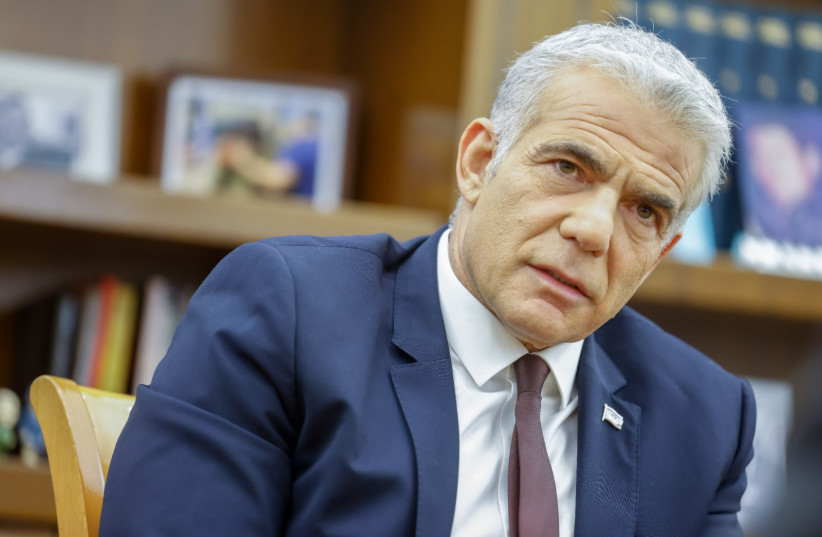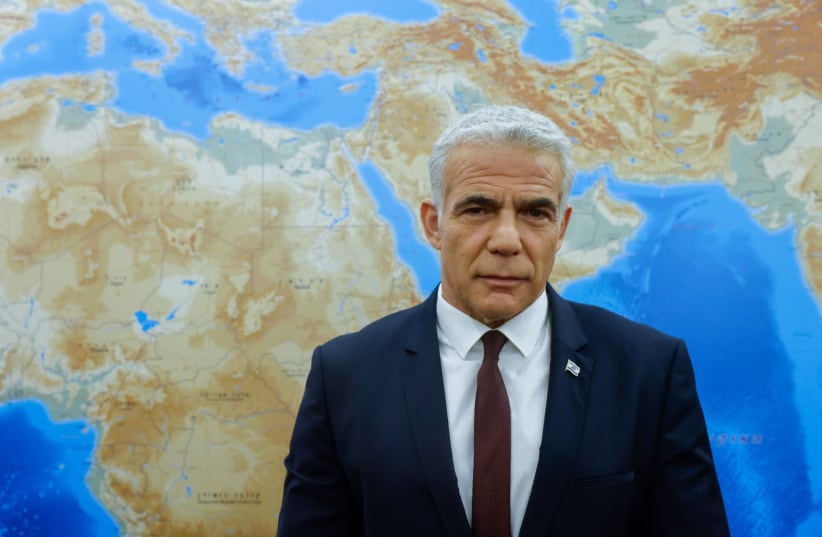Israel is growingly concerned by the “dangerous closeness” between Russia and Iran over the supply of drones manufactured in the Islamic Republic to attack Ukraine and is, as a result, holding daily assessments to review its position on the conflict, Prime Minister Yair Lapid told The Jerusalem Post.
“Part of the work we’re doing has to do with the very dangerous closeness that is being created between Russia and Iran,” he told the Post in an interview on Sunday. “It’s not something we are going to ignore or do nothing about… so what we need to do is reassess on a daily basis and react.”
A full interview with Lapid will be published in Friday’s print edition.
Lapid said Israel was holding close consultations with the Americans about the developing situation. Last Thursday, he spoke by phone with Ukrainian Foreign Minister Dmytro Kubela, and the issue came up. Iran has supplied Russia with scores of drones – including suicide ones – that have been used to attack Ukrainian civilian centers.
Asked what is holding Israel back from providing Ukraine with missile-defense systems, Lapid said he was balancing two considerations.


“One is we are on Ukraine’s side,” he said. “We are supporting them. We just voted at the UN [General Assembly], telling the world that we will never accept the annexation of the four regions [of Ukraine by Russia]. We are still the only country in the world that built a field hospital in Ukraine.”
The other consideration “is making sure Israel’s national security interests are being protected at all times,” he said.
Though Lapid did not specify, Israel’s policy of not providing Ukraine with weapons is due in part to a deconfliction mechanism between Jerusalem and Moscow that allows Israel to strike Iranian targets in Syria without clashing with Russian forces stationed there. On Monday, Israel allegedly struck a target near Damascus.
While Israel has not supplied weapons, it has said it is willing to help Ukraine set up a civilian early-warning system for missiles.
“So, we are going to support Ukraine,” Lapid said. “We are going to be proactive in supporting Ukraine, and we are going to take Israel’s national security interest into account.”
Lapid: Israel Election and Benjamin Netanyahu
Turning to politics, Lapid said the upcoming election on November 1 is a choice between the bloc led by Benjamin Netanyahu, which wants to undermine democracy, and the “Change Coalition” he now leads, which wants to protect it.
“We are going to protect Israeli democracy. Instead of attacking it, we're going to protect the Supreme Court. We're going to protect the LGBT community. We're going to protect women's rights. All the things that are now under attack, we are going to keep on doing what we are doing, which is working very, very hard for the Israeli people.”
Israeli Prime Minister Yair Lapid
“We are going to protect Israeli democracy,” he said. “Instead of attacking it, we’re going to protect the Supreme Court. We’re going to protect the LGBT community. We’re going to protect women’s rights. All the things that are now under attack, we are going to keep on doing what we are doing, which is working very, very hard for the Israeli people.”
“And this is the difference, because so many of the problems we’re facing today is because they were in power for 12 years and did nothing about things like cost of living,” he added. “This is why it’s ridiculous to me that they’re saying they are going to solve this. You were there for 12 years, and you did nothing.”
Iran, the nuclear deal and supplying drones to Russia
Regarding Iran, Lapid said its supply of drones and other weapons to Russia was further proof that a return to the 2015 Iran nuclear deal was unviable.
Though Iran nuclear talks are currently off the table, he warned against being “too comfortable,” saying: “It didn’t evaporate completely.”
“We do think, and we are talking to all our allies and friends about this, that since this is not working, it’s time to start the discussion about the ‘longer and stronger’ agreement,” he said.
Israel “brought proof” to world powers months ago that showed Iran was lying on the nuclear file as well, Lapid said. That proof had an impact on the US and European countries involved in nuclear talks with Iran earlier this year, because the government successfully built a dialogue with them that was “very open, sometimes on the verge of being blunt, and yet was respectful and truthful.”
“There wasn’t a moment in which they suspected or hinted that they questioned the quality of the kind of intelligence we were presenting, because they knew it’s… Israeli policy now to make sure everything we are bringing to the table is truthful, whether or not it goes with the story we are telling,” Lapid said.
The full interview will appear in Friday’s print edition.
